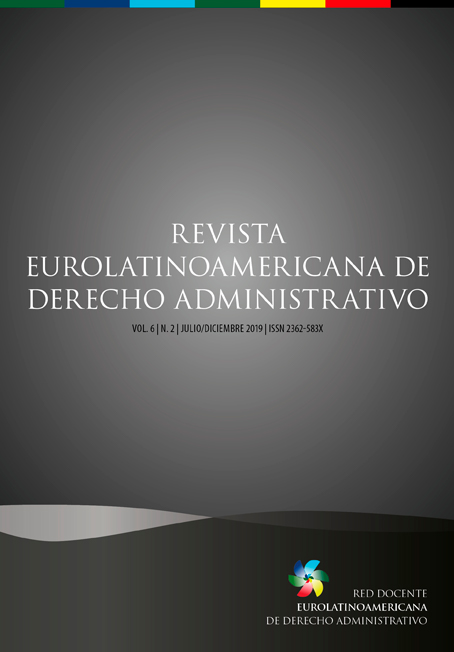Social inequality and democratic legitimacy: a reading of constitutional amendment n° 95 of 2016 from Thomas Piketty and Jürgen Habermas
DOI:
https://doi.org/10.14409/redoeda.v6i2.8896Keywords:
Constitutional Amendment No. 95 of 2016, economic inequality, financial crisis, financial system, public debtAbstract
This article aims to analyze Constitutional Amendment No. 95 of 2016, relating it to the problem of economic inequality that exists in Brazil. Thomas Piketty's work is based on the results of a worldwide pattern of concentration of income from work and capital in the hands of the wealthiest strata of the population, a characteristic that is present in Brazil. We question (i) the democratic legitimacy of the aforementioned amendment, based on the exposition of themes concerning the financial system and the Brazilian public debt system. Finally, questions are raised about the official discourse propagated by the Federal Government and the mainstream media, with regard to the need for approval of the amendment and its consequences, inquiring about the validity of the theory of democracy based on deliberative politics, elaborated by Jürgen Habermas, before the Brazilian political and socioeconomic reality. It was concluded that Constitutional Amendment No. 95 of 2016 is clearly illegitimate from a democratic point of view, since during the process of social and legislative discussion, the introduction by the Government and the mainstream media of relevant issues was not verified, as the great social inequality existing in the country and the worsening of it due to the reduction of social investments; as well as the cyclical characteristic of capitalism in relation to the occurrence of financial crises; the situation of the Brazilian public debt; and the performance of the State in the Financial System as a major fundraiser of financial capital.
References
BRASIL. IBGE. Projeção da população do Brasil e das Unidades da Federação. Disponível em: <https://ww2.ibge.gov.br/apps/populacao/projecao/>. Acesso em: 19/09/2018.
CARVALHO, Laura. Valsa brasileira: do boom ao caos econômico. São Paulo: Todavia, 2018.
HABERMAS, Jurgen. Direito e Democracia: entre facticidade e validade. Rio de Janeiro: Landy, 2004.
HARVEY, David. Os limites do capital. São Paulo: Boitempo, 2013.
LUBENOW, Jorge Adriano. Esfera pública e democracia deliberativa em Habermas: modelo teórico e discursos críticos. Kriterion, Belo Horizonte, v. 51, n. 121, p. 227-258, jun. 2010. Disponível em: < http://www.scielo.br/scielo.php?script=sci_arttext&pid=S0100-512X2010000100012&lng=en&nrm=iso > Acesso em: 24/02/2019.
MARX, Karl. O capital: crítica a economia política. São Paulo: Nova Cultural, 1986.
MEDEIROS, Marcelo; SOUZA, Pedro H. G. Ferreira de; CASTRO, Fábio Ávila de. O topo da distribuição de renda no Brasil: Primeiras estimativas com dados tributários e comparação com pesquisas domiciliares (2006-2012). Dados: Rio de Janeiro, vol. 58, n.1, pp. 7-36, 2015.
MORENO, Fernando Díez. El estado social. Madrid: Cuadernos y debates, 2004.
PIKETTY, Thomas. O capital no século XXI. Rio de Janeiro: Intrínseca, 2014.
PAIVA. Ana Cláudia Soares de. O controle opinativo da mídia jornalística tradicional dentro do caos de um governo golpista. Campina Grande: Editora Realize, 2017. Disponível em http://www.editorarealize.com.br/revistas/sinalge/trabalhos/TRABALHO_EV066_MD1_SA6_ID923_18022017142056.pdf> Acesso em: 24/02/2019.
PINTO, José Marcelino de Rezende. A teoria da ação comunicativa de Jürgen Habermas: conceitos básicos e possibilidades de aplicação à administração escolar. Paidéia (Ribeirão Preto), Ribeirão Preto, n. 8-9, p. 77-96, Aug. 1995. Disponível em: <http://www.scielo.br/scielo.php?script=sci_arttext&pid=S0103-863X1995000100007&lng=en&nrm=iso> Acesso em: 24/02/2019.
SOUZA, Jessé; VALIM, Rafael; et al. Resgatar o Brasil. São Paulo: Contracorrente/Boitempo, 2018.
STRECK, Lenio Luiz. Verdade e consenso: constituição, hermenêutica e teorias discursivas. São Paulo: Saraiva, 2011.
WORLD INEQUALITY DATABASE. Disponível em:
<http://www.scielo.br/scielo.php?script=sci_arttext&pid=S0103-863X1995000100007&lng=en&nrm=iso> Acesso em: 24/02/2019.
Downloads
Published
How to Cite
Issue
Section
License
Authors who publish in this Journal agree to the following terms:
- Authors retain copyright and grant the Journal of Constitutional Research the right of first publication with the article simultaneously licensed under the Creative Commons - Attribution 4.0 International which allows sharing the work with recognition of the authors and its initial publication in this Journal.
- Authors are able to take on additional contracts separately, for non-exclusive distribution of the version of the paper published in this Journal (eg.: publishing in institutional repository or as a book), with a recognition of its initial publication in this Journal.
- Authors are allowed and encouraged to publish their work online (eg.: in institutional repositories or on their personal website) at any point before or during the submission process, as it can lead to productive exchanges, as well as increase the impact and the citation of the published work (see the Effect of Open Access).



























.png)





